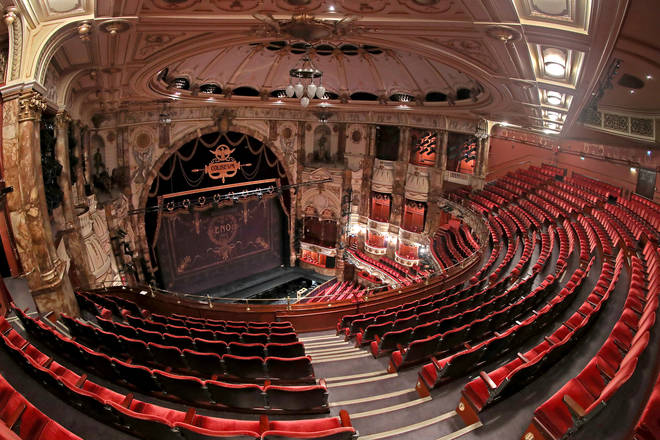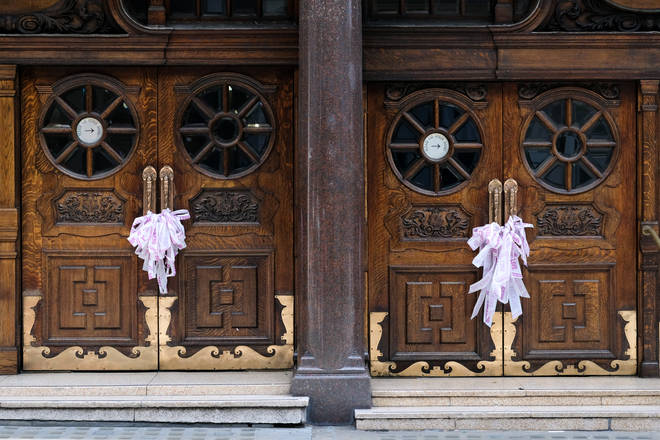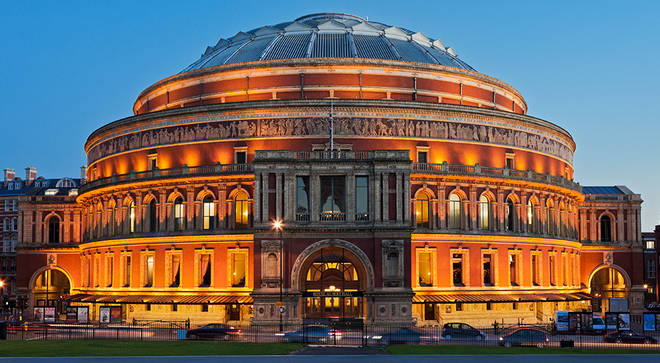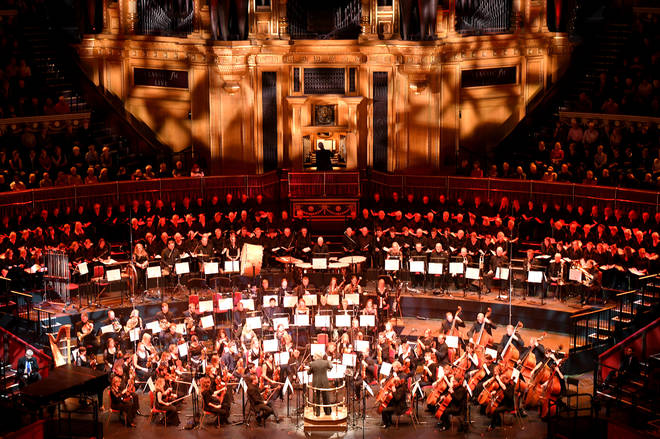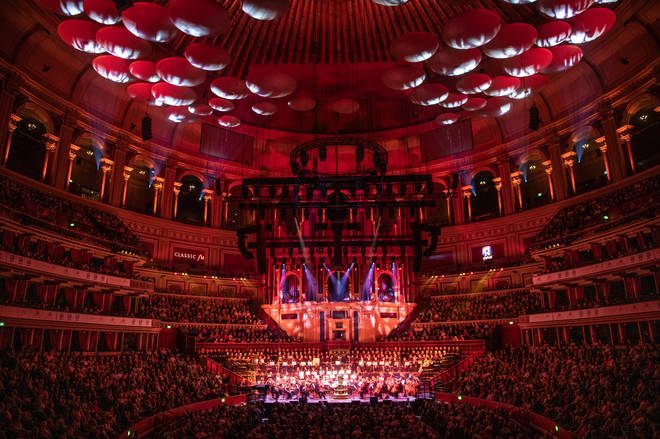Early life and career
Victor Borge was born Børge Rosenbaum on 3 January 1909 in Copenhagen, Denmark, into an Ashkenazi Jewish family. His parents, Bernhard and Frederikke (née Lichtinger) Rosenbaum, were both musicians: his father a violist in the Royal Danish Orchestra,[5][6] and his mother a pianist.[7] Borge began piano lessons at the age of two, and it was soon apparent that he was a prodigy. He gave his first piano recital when he was eight years old, and in 1918 was awarded a full scholarship at the Royal Danish Academy of Music, studying under Olivo Krause. Later on, he was taught by Victor Schiøler, Liszt's student Frederic Lamond, and Busoni's pupil Egon Petri.
Borge played his first major concert in 1926 at the Danish Odd Fellow Palæet (The Odd Fellow's Lodge building) concert hall. After a few years as a classical concert pianist, he started his now famous "stand-up" act, with the signature blend of piano music and jokes. He married the American Elsie Chilton in 1933; the same year he debuted with his revue acts.[8] Borge started touring extensively in Europe, where he began telling anti-Nazi jokes.
When the German armed forces occupied Denmark on 9 April 1940, during World War II, Borge was playing a concert in Sweden and managed to escape to Finland.[9] He travelled to America on the United States Army transport American Legion, the last neutral ship to make it out of Petsamo, Finland,[10][11] and arrived 28 August 1940, with only $20 (about $365 today), with $3 going to the customs fee. Disguised as a sailor, Borge returned to Denmark once during the occupation to visit his dying mother.[12]
Move to America
Even though Borge did not speak a word of English upon arrival, he quickly managed to adapt his jokes to the American audience, learning English by watching movies. He took the name of Victor Borge, and in 1941, he started on Rudy Vallee's radio show.[13] He was hired soon after by Bing Crosby for his Kraft Music Hall programme.[14]
Borge quickly rose to fame, winning Best New Radio Performer of the Year in 1942. Soon after the award, he was offered film roles with stars such as Frank Sinatra (in Higher and Higher). While hosting The Victor Borge Show on NBC beginning in 1946,[15] he developed many of his trademarks, including repeatedly announcing his intent to play a piece but getting "distracted" by something or other, making comments about the audience, or discussing the usefulness of Chopin's "Minute Waltz" as an egg timer.[16] He would also start out with some well-known classical piece like Beethoven's "Moonlight Sonata" and suddenly move into a harmonically similar pop or jazz tune, such as Cole Porter's "Night and Day" or "Happy Birthday to You."
Borge's style
One of Borge's other famous routines was "Phonetic Punctuation," in which he read a passage from a book and added exaggerated sound effects to stand for all of the punctuation marks, such as periods, commas, and exclamation marks.[17] Another is his "Inflationary Language," in which he added one to every number or homophone of a number in the words he spoke. For example: "once upon a time" becomes "twice upon a time", "wonderful" becomes "twoderful", "forehead" becomes "fivehead", "anyone for tennis" becomes "anytwo five elevennis", "I ate a tenderloin with my fork and so on and so forth" becomes "I nined an elevenderloin with my fivek and so on and so fifth".[14]
Borge performing before an audience in 1957
Borge used physical and visual elements in his live and televised performances. He would play a strange-sounding piano tune from sheet music, looking increasingly confused; turning the sheet upside down or sideways, he would then play the actual tune, flashing a joyful smile of accomplishment to the audience (he had, at first, been literally playing the tune upside down or sideways). When his energetic playing of another song would cause him to fall off the piano bench, he would open the seat lid, take out the two ends of an automotive seat belt, and buckle himself onto the bench, "for safety." Conducting an orchestra, he might stop and order a violinist who had played a sour note to get off the stage, then resume the performance and have the other members of the section move up to fill the empty seat while they were still playing. From off stage would come the sound of a gunshot.
His musical sidekick in the 1960s, Leonid Hambro, was also a well-known concert pianist.[18] In 1968, classical pianist Şahan Arzruni joined him as his straight man, performing together on one piano a version of Liszt's Second Hungarian Rhapsody, considered a musical-comedic classic.[19]
He also enjoyed interacting with the audience. Seeing an interested person in the front row, he would ask them, "Do you like good music?" or "Do you care for piano music?" After an affirmative answer, Borge would take a piece of sheet music from his piano and say, "Here is some," and hand it over. After the audience's laughter died down, he would say, "That'll be $1.95" (or whatever the current price might be). He would then ask whether the audience member could read music; if the member said yes, he would ask a higher price. If he got no response from the audience after a joke, he would often add "...when this ovation has died down, of course." The delayed punchline to handing the person the sheet music would come when he would reach the end of a number and begin playing the penultimate notes over and over, with a puzzled look. He would then go back to the person in the audience, retrieve the sheet music, tear off a piece of it, stick it on the piano, and play the last couple of notes from it.
Making fun of modern theater, he would sometimes begin a performance by asking if there were any children in the audience. There always were, of course. He would sternly order them out, then say, "We do have some children in here; that means I can't do the second half in the nude. I'll wear the tie (pause). The long one (pause). The very long one, yes."[20]
In his stage shows in later years, he would include a segment with opera singer Marilyn Mulvey. She would try to sing an aria, and he would react and interrupt, with such antics as falling off the bench in "surprise" when she hit a high note. He would also remind her repeatedly not to rest her hand on the piano, telling her that if she got used to it, "and one day a piano was not there – Fffftttt! " After the routine, the spotlight would rest on Mulvey, and she would sing a serious number with Borge accompanying in the background.
Later career
Borge appeared on Toast of the Town hosted by Ed Sullivan several times during 1948. He became a naturalized citizen of the United States the same year. He started the Comedy in Music show at John Golden Theatre in New York City on 2 October 1953. Comedy in Music became the longest running one-man show in the history of theater with 849 performances when it closed on 21 January 1956, a feat which placed it in the Guinness Book of World Records.[21]
Continuing his success with tours and shows, Borge played with and conducted orchestras including the Chicago Symphony Orchestra,[22] the New York Philharmonic[23] and London Philharmonic.[24] Always modest, he felt honored when he was invited to conduct the Royal Danish Orchestra at the Royal Danish Theatre in Copenhagen, Denmark, in 1992.
His later television appearances included his "Phonetic Punctuation" routine on The Electric Company in a filmed sketch.[25] He would also use this sketch on The Electric Company's LP record to follow, during its "Punctuation" song.[26] In addition, he appeared several times on Sesame Street,[27][28][29][30] and he was a guest star during the fourth season of The Muppet Show.[31][32][33]
Victor Borge continued to tour until his last days, performing up to 60 times per year when he was 90 years old.
Other endeavors
Borge made several appearances on the long-running TV show What's My Line?, both as a celebrity panelist, and as a contestant with the occupation "poultry farmer" (the latter was not a comedy routine; as a business venture, Borge raised and popularized Rock Cornish game hens starting in the 1950s).[34]
Borge helped start several trust funds, including the Thanks to Scandinavia Fund,[35] which was started in dedication to those who helped the Jews escape the German persecution during the war.[35]
Aside from his musical work, Borge wrote three books, My Favorite Intermissions[36] and My Favorite Comedies in Music[37] (both with Robert Sherman), and the autobiography Smilet er den korteste afstand ("The Smile is the Shortest Distance") with Niels-Jørgen Kaiser.[38]
In 1979, Borge founded the American Pianists Association (then called the Beethoven Foundation) with Julius Bloom and Anthony P. Habig. The American Pianists Association now produces two major piano competitions: the Classical Fellowship Awards and the Jazz Fellowship Awards.[39]


